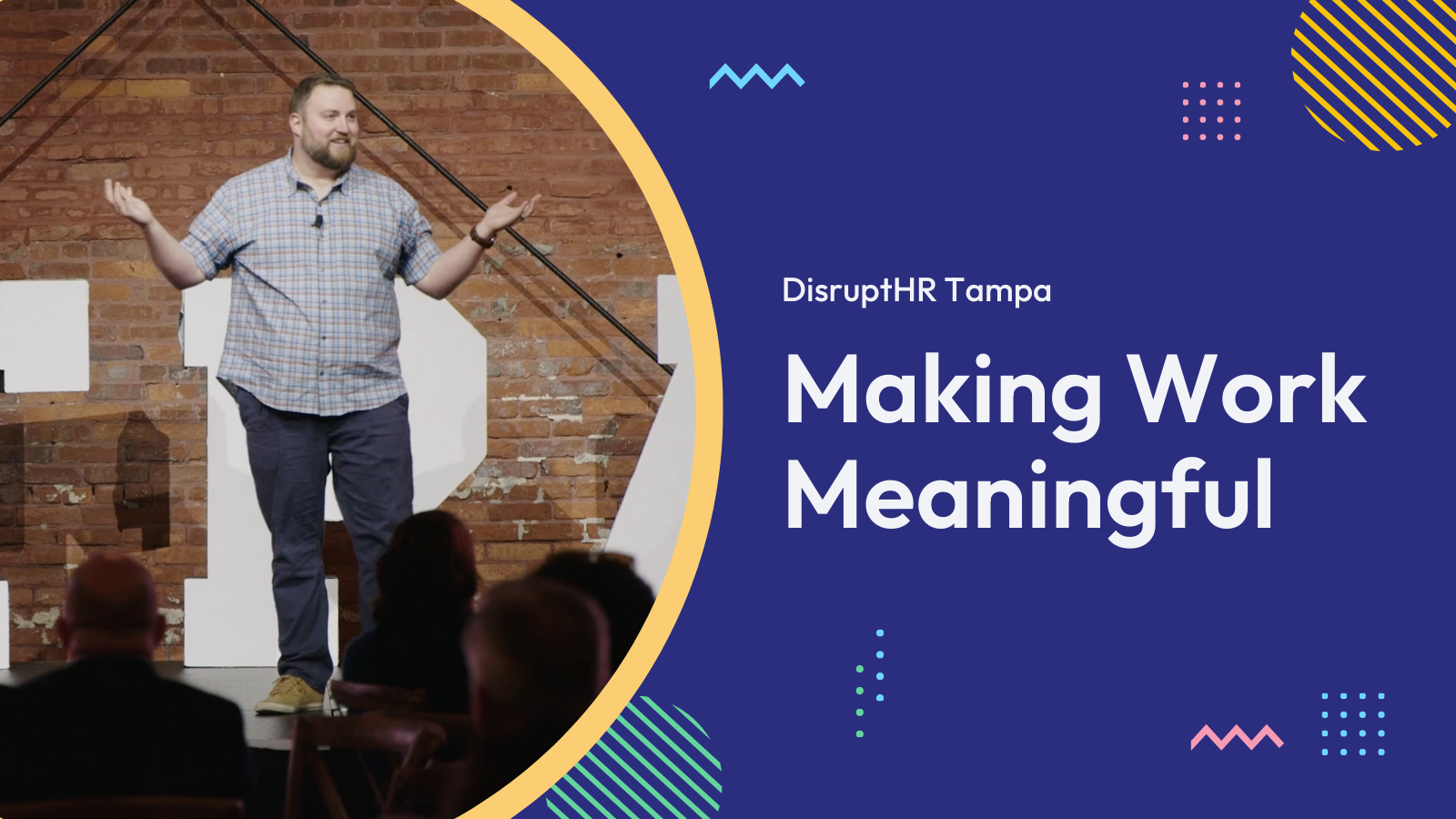I recently had the opportunity to speak at DisruptHR in Tampa, FL about the future of work. If you know me at all, you know it won’t simply be about the future of work: we’re talking about the future, full stop.
Watch the video here, or read the transcript below – I'd love to hear what you think!
This talk is very much near and dear to my heart. It really comes out of a lot of reflection, not just on work, but on what it means to live a fulfilling life. So to get things kicked off, I’d like to talk a little bit about the stakes.
We’re facing any number of challenges in the world today, whether it’s war or climate change, racial and gender equality, clean water access…the list goes on and on. Solving these seemingly intractable problems is critical to realizing our collective potential. So the obvious question here is, “How do we go solve them?”
The answer is: we solve them. Right? You and I. We take responsibility for the change that we want to see in the world, and the way we do that is through the way we spend our time, one-third of which is spent at work.
So to be clear, I’m not advocating that we all kind of quit our jobs and join a nonprofit. What we’re really talking about here is your for-profit business being part of something bigger than itself. So let’s talk a bit about the business case.
Google’s done a bunch of research into what made their teams most performant, and what they found was two of the top five were meaning and impact. Teams perform better when their work has personal significance and they can see the positive impact of their actions on the world.
Likewise, Zappos has been researching happiness for over 10 years, and they found four key cornerstones, one of which was vision and meaning. People find it especially gratifying to work on something that matters to them.
And then lastly, we’ve been talking a lot about the Great Resignation and being able to attract and retain talent. LinkedIn recently put out a survey that showed the number one thing that Gen Y and Gen Z are looking for in their next job is work that aligns with their values.
And so you might be thinking, Okay, Greg, I get it. That all sounds nice but…
Who’s skeptical here, raise your hand, that you’re going to be the next social enterprise?
Members of the audience raise their hands.
Yeah so…don’t lose hope. There’s potential. And so to try to walk you through that, I’d like to take an example of a business that’s very obviously not a social enterprise and actually has all the ingredients to go be one with just a small shift in perspective. So see if you can figure out what this is, but they’re famous for their golden arches and their billions served.
In the future, if you were to walk into this restaurant as a social enterprise, you might go to the counter, and the cashier is genuinely excited to see you and their candor impresses. Even before you have the chance to finish paying for your order, the back staff is already diligently preparing it with a focused determination.
And while you wait to receive your meal, you look around the dining room, and you notice that a particularly talkative employee is chatting up the regulars by first name because they recognize all of them. And when you get your food, lo and behold, for the first time in your life, it looks just like it does in the commercial. The cheese…the cheese is centered on the patty.
What changed, right, to create this seemingly idyllic version of McDonald’s?
Imagine if the Ronald McDonald House was the reason McDonald’s exists. Imagine if every employee at McDonald’s was working like their efforts were going to alleviate the financial challenges of a family in turmoil.
Social impact drives performance, it instills pride in the mission, and it changes people’s lives. To be clear, I didn’t change what McDonald’s did. I changed why they did it, and that changed how they did it.
You can perform a similar transformation in your business. All you have to do is align your business model around social impact and lead accordingly. So how do you identify that right social impact for you?
Well it really lies at the intersection of your company’s core competency and what your employees care about. And that ensures that who you are, what you do, and why you do it are well-aligned so this feels like a natural extension of your company’s identity.
For example, if you’re an engineering company, you might invest in mentoring underrepresented students in STEM education. Or if you’re a renewable energy company, you could invest in the local parks or start a community garden.
Then once you’ve identified that impact, you want to build a very intentional culture around it. Highlight bright spots, be decisive when you see behavior inconsistent with those values…and you’re going to find you have employees who are super excited about this and want to step up. Give them a chance to lead, and reward the change you want to see.
So as I get ready to wrap up here, I’d like to leave you with something to reflect on. I mentioned that this isn’t just about work. It’s about what it means to live a fulfilling life and the outsize role work plays as such a dominant recipient of our time.
So we’re getting back to work tomorrow. We’re going to be sending emails and setting up meetings and scheduling interviews and shipping product, and I’d like you to ask yourself, Why? For what purpose are we expending all this time and all this effort?
My hope is, after a bit of reflection, you’ll say it’s more than a paycheck. We’re leaving the world better than we found it. Thank you.
Want to build a more resilient business? We can help you align your workforce around social impact to attract and retain talent and drive performance. Contact us at hello@onework.co – we'd love to help you advance your mission!



